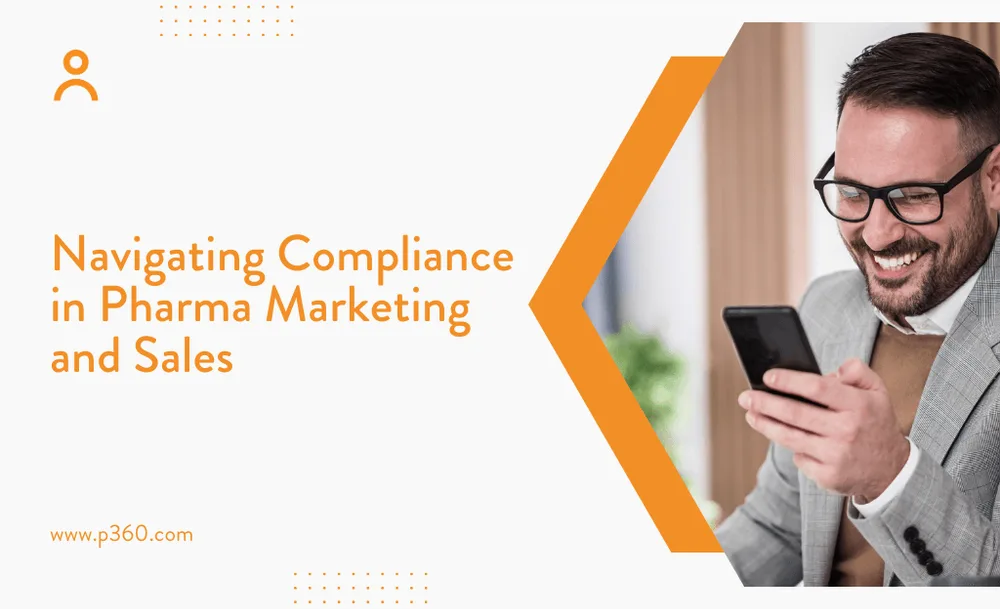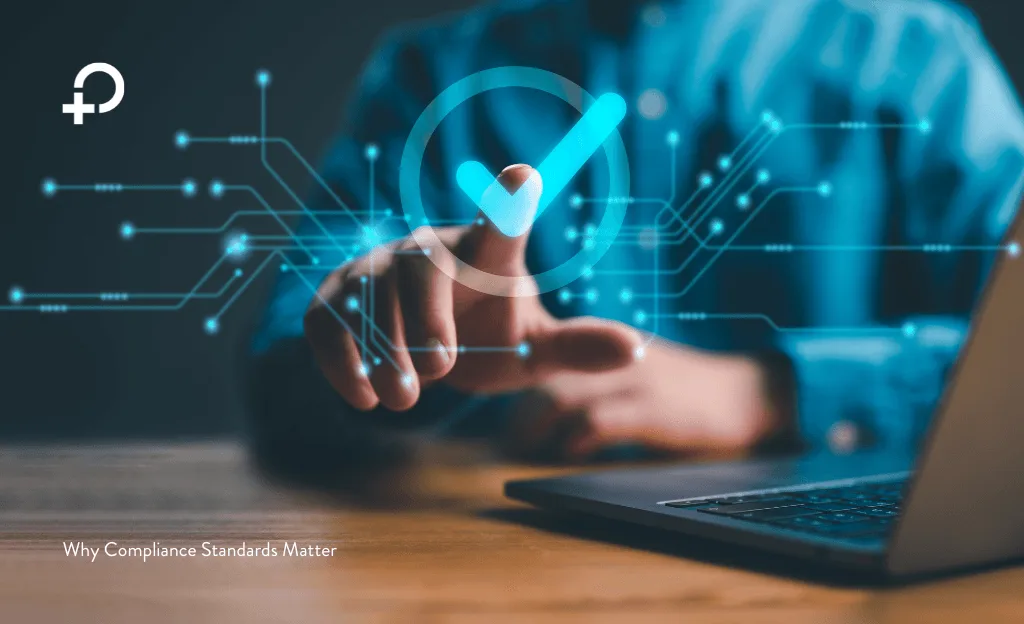Pharma Compliance: Essential Strategies for Marketing and Sales Excellence

by Kathleen McQuade | Last Updated: December 14, 2023 | 1 min read
The pharmaceutical industry is a key player in advancing patient care. Through their development of novel diagnostics and therapeutics, physicians and other medical professionals are able to detect and treat health disorders and diseases more effectively. However, like any industry, pharma is not free from legal and ethical standards that must be adhered to. And in the context of pharma marketing and sales, compliance is of vital importance.
Why? Because compliance helps ensure that patient care remains a top priority, above all else. Not to mention, compliant organizations face fewer liabilities. Non-compliance in pharma marketing and sales efforts can result in serious consequences ranging from regulatory fines and lawsuits to reputational harm. There are even criminal considerations.
In March 2023, the Department of Justice (DOJ) updated its Evaluation of Corporate Compliance Programs (ECCP). This document1 is meant to serve as a guidance document for prosecutors when evaluating corporate compliance programs. Among other updates, the ECCP Guidance now includes a new directive for assessing how companies govern employees' use of personal devices, communication platforms and messaging applications.
It’s a lot to take in, and we feel your pain! So, to help executives cut through the compliance clutter, we’re doing a deep dive into why it plays such a crucial role in pharma’s sales and marketing efforts. We’ll look at what compliance means, discuss the risks involved with non-compliance, and outline a framework for achieving compliance in pharma marketing and sales.
What Does Complaint in Pharma Marketing Mean?
Being compliant in pharma marketing means adhering to the regulatory guidelines and ethical standards set forth by relevant authorities. It involves conducting marketing and promotional activities in a manner that is transparent, accurate and prioritizes patient safety and care. When it comes to pharmaceutical marketing, there are a lot of rules and regulations that companies must follow. But what exactly does compliance look like in practice?
At its most basic level, compliance in pharma marketing refers to following all of the laws and regulations related to drug promotion and advertising. These laws are in place to protect the public from false or misleading information and ensure that drugs are promoted in a safe and effective manner. Some of the key guidelines that companies must follow include:
- Disclosing all known risks and side effects of a drug.
- Only promoting a drug for its approved use(s).
- Not making false or misleading claims about a product's effectiveness or safety.
- Including all necessary warnings and precautions in promotional materials.
And while compliance is critical, it can also be challenging to navigate. Some of the common issues that companies face when it comes to staying compliant include:
- Balancing the need to promote products with the need to disclose risks and potential side effects.
- Staying up to date on changing laws and regulations across multiple jurisdictions.
- Managing the complexity of global marketing campaigns that must abide by different rules in different countries.
- Ensuring that all employees, from marketing teams to sales reps, are on the same page when it comes to compliance.
By prioritizing these aspects, pharmaceutical companies can ensure that their pharma marketing and sales activities align with legal requirements, ethical considerations, and patient-centered care, ultimately benefiting both the industry and the individuals who rely on their products.

Why Compliance Standards Matter in Pharma Marketing
The pharmaceutical industry is highly regulated, and this is important for several reasons. First, the industry involves people's health and well-being. And second, healthcare is a major expense for most people. For these reasons, governments and industry bodies have put strict regulations and guidelines in place to ensure that drugs are marketed and sold ethically and responsibly. Let's delve into the key reasons why compliance is crucial in Pharma Marketing:
-
Patient Safety: Compliance regulations in pharma marketing and sales are designed to prioritize patient safety. By adhering to approved indications, providing accurate and balanced information, and promptly reporting adverse events, compliance helps ensure that patients receive medications that are appropriate for their specific conditions. It prevents off-label promotion, misleading claims and potential risks associated with inaccurate or incomplete information.
-
Regulatory Adherence: Pharmaceutical companies operate within a complex web of regulations and guidelines enforced by regulatory bodies such as the FDA, EMA and other authorities. Compliance ensures that companies meet the legal requirements and standards set forth by these regulatory agencies. Failure to comply can result in significant penalties, fines, legal repercussions and reputational damage for the organization.
-
Ethical Standards: Compliance in pharma marketing and sales upholds ethical standards in the industry. It ensures that promotional activities are conducted with integrity, transparency and fairness. By providing truthful and balanced information, avoiding conflicts of interest and disclosing financial relationships, compliance fosters trust among healthcare professionals, patients and the public. It contributes to maintaining the reputation and credibility of pharmaceutical companies.
-
Protection against Misleading Practices: Compliance regulations safeguard against misleading marketing practices. They prevent the dissemination of false or exaggerated claims about pharmaceutical products, ensuring that patients and healthcare professionals receive accurate information to make informed decisions. Compliance guidelines also govern advertising content, ensuring that it is fair, balanced and does not unduly influence patients' choices.
-
Preventing Off-Label Promotion: Compliance guidelines in pharma marketing strictly prohibit off-label promotion, which refers to marketing a medication for uses not approved by regulatory agencies. This is important because off-label use can pose potential risks, as the medication may not have undergone rigorous testing or be supported by sufficient evidence for the specific use. Compliance prevents companies from making misleading claims or encouraging off-label use, protecting patients from potential harm.
-
Reputation and Trust: Compliance in pharma marketing and sales is vital for building and maintaining a positive reputation in the industry. By adhering to ethical standards and regulatory requirements, companies demonstrate their commitment to patient welfare and responsible business practices. This fosters trust among healthcare professionals, patients, regulatory authorities and other stakeholders, enhancing the company's standing and long-term success.
Additionally, non-compliance can be costly. That’s why it’s important to understand the risks associated with non-compliance in pharma sales and marketing. Below are a few of the risks executives need to consider.
Explore More Relevant Articles on P360
- Healthcare Providers' Expectations from Pharma Sales Reps
- The Importance of Effective HCP Engagement for Successful Pharma Marketing and Sales
- Compliance Enabled Text Messages for effective HCP Engagement for Pharma Sales Reps
- P360 Presents ZING During the Diversity Alliance for Science’s (DA4S) East Coast Conference
- The Art and Science of Omnichannel Marketing
Risks of Non-Compliance in Pharma Marketing
Non-compliance with regulations exposes pharma companies to many risks that could result in legal penalties, fines and even prosecution. Beyond that, there are reputational damages that can result in the loss of brand value, en-masse business loss, lower investor confidence and disruption to various pharmaceutical operations. Here’s a closer look:

-
Risk of hefty fines and penalties: Non-compliance with regulations could cost pharmaceutical companies millions of dollars in civil and criminal fines. The United States Department of Justice and the Department of Health and Human Services’ Office of Inspector General target pharmaceutical companies that violate regulations such as the False Claims Act. The U.S. Food and Drug Administration (FDA) also levies civil monetary fines and product recalls against pharma companies that violate its regulations.
-
Legal action and loss of licenses: A pharma company that does not comply with regulations will face various legal issues that may cause its license to be revoked. The pharma company may also be sued by consumers who argue they were injured by the medication or off-label usage. There is also a risk of prosecution. While some companies may bounce back from the damage, others may face damages and cease operations entirely.
-
Reputational risk: The amount of trust that consumers place in the pharma industry is crucial, making brand reputation a hugely important metric for assessing the success of different companies. With so many consumers ranking trust as a major factor they consider when choosing a medical provider, a single instance of non-compliance can alter the outlook of the pharma company as a trustworthy organization leading to a lack of sales or loss of business entirely.
-
Ethical implications: Non-compliant pharma marketing and sales practices can erode confidence in a company’s integrity, leading to company representatives adopting unethical practices such as bribing healthcare professionals or falsifying data. Non-compliance can ultimately affect an organization's ethical operations, which could lead to patient harm and other violations of the law.
-
Business Loss: Companies that are found guilty of non-compliance face civil penalties, lawsuits, and potential imprisonment of top-level executives from the C-Suite level to several middle management levels. This could lead to decreased profitability, loss of market share, and a hit to a company's brand. Additionally, it could lead to reduced investor confidence, decreasing future prospects of raising equity funding.
The pharmaceutical industry is an intense business with numerous rules and regulations that can be overwhelming. But it’s important for pharma companies to prioritize compliance to avoid these risks and remain a reliable, reputable and profitable business in the long run. And to help with that, the following is a framework that pharma executives can follow to help ensure their marketing and sales teams remain compliant.
Compliance Framework in Pharma Marketing and Sales
Compliance in pharma marketing and sales is not a one-time activity but a continuous commitment requiring robust systems, internal controls, and training programs. Here are some key measures pharmaceutical companies should implement to ensure compliance.

-
Adherence to Approved Indications: Compliance requires pharmaceutical companies to market and sell their products strictly for the indications approved by regulatory agencies. This means avoiding off-label promotion or misleading claims about the medication's use, device use cases and proper indications among other things. Having approved content to be able to disseminate is of major importance for this reason.
-
Truthful and Balanced Information: Compliance regulations demand the provision of accurate, balanced and evidence-based information about pharmaceutical products. Pharmaceutical marketing materials must present both the benefits and risks associated with the medication, ensuring that promotional claims are not exaggerated or misleading.
-
Regulatory Approval for Promotional Materials: All promotional materials, including advertisements, brochures, websites and sales aids, must undergo a thorough review and obtain regulatory approval before use. Compliance involves ensuring that these materials meet the guidelines and accurately represent the product's attributes and are not misleading in any way.
-
Compliance with Advertising Regulations: Advertising prescription drugs to the public is subject to strict regulations in most countries. Pharma compliance means following the specific guidelines governing advertising content, ensuring it is fair, accurate and not misleading. The information provided should help patients make informed decisions and encourage them to consult healthcare professionals.
-
Adverse Event Reporting: Compliance requires pharmaceutical companies to establish systems for monitoring and reporting adverse events associated with their products. Timely reporting of adverse events is essential for patient safety and allows regulatory authorities to take appropriate measures if needed.
-
Transparency in Financial Relationships: Compliance regulations also emphasize transparency in financial relationships between pharmaceutical companies, healthcare professionals and organizations. It is essential to disclose any financial ties or conflicts of interest that may influence promotional activities or prescribing patterns. Transparency fosters trust and ensures ethical conduct in the industry.
-
Comprehensive Policies and Procedures: Companies establish internal policies and procedures that outline compliance requirements, ensuring that all employees are aware of their roles and responsibilities. These policies cover areas such as promotional materials review, interactions with healthcare professionals, and reporting obligations.
-
Compliance Training and Education: Ensuring compliance involves providing regular training programs to employees involved in pharma marketing and sales activities. These programs educate them about regulations, guidelines and ethical considerations relevant to their roles. Employees must understand their obligations and make informed decisions that align with compliance requirements.
-
Monitoring and Auditing: Compliance also entails monitoring marketing and sales activities to identify and rectify any non-compliant practices. Internal audits help assess adherence to regulations, identify gaps and implement corrective measures. Monitoring also involves staying up to date with evolving regulatory requirements.
-
Collaboration with Regulatory Authorities: Compliance is reinforced through collaboration and cooperation with regulatory authorities. Pharmaceutical companies engage with these authorities to seek guidance, clarify regulations, and ensure their marketing practices align with the latest standards.
-
Ethical Culture and Values: Compliance in pharma marketing and sales is rooted in cultivating an ethical culture within organizations. By fostering a commitment to patient welfare, integrity, and ethical decision-making, companies create an environment where compliance is ingrained in every aspect of their operations.
As the pharmaceutical industry continues to evolve, compliance will likely remain a critical part of marketing and advertising efforts. New technologies and channels for reaching HCPs will undoubtedly pose new challenges for companies to navigate. For example, with more and more people reaching for their phones whenever they need to send a message, texting has steadily become the preferred form of communication globally. And the easiest way to enable compliant text messaging is with P360’s ZING Engagement Suite.
ZING Simplifies Pharma Marketing Compliance Effortlessly.
While SMS-based conversational engagement is taking the world by storm compliance measures have been difficult to ensure with traditional text messaging. But not anymore. Compliance-enabled text messaging is easy to implement with solutions like ZING. With ZING, all the messages, digital assets and replies sales teams send to HCPs can be preapproved by compliance and preloaded into the system. That way, nothing gets out that isn’t already approved.
In addition, ZING’s intuitive user portal, which can be branded and completely customized, offers administrators a simple way to track individual messages, link clicks, digital asset views and more. And all of ZING’s data can be stored for up to 10 years and pulled into a report for legal upon request. The data from the system also integrates back to sales profiles in existing CRM systems. Certain keywords can also be marked as prohibited, while others can be flagged for review.
With ZING, pharma teams can exchange compliant two-way unified messaging with HCPs without barriers. There are no apps for end-users to download and there are no subscriptions for them to deal with. To HCPs, ZING offers a seamless, hassle-free experience that’s seen as nothing different than their normal method for receiving texts. To learn more, visit P360.com.
Final Thoughts on compliance in Pharma Marketing
In the end, the goal of compliance will always be to protect public health and safety. By staying up to date on new laws and regulations, investing in compliance-related resources like ZING, and making a commitment to ethical marketing practices, pharma companies can continue to build trust with both their customers and regulators alike. To do this, it is essential that companies remain vigilant, and proactive and continuously adapt their compliance programs to reflect the latest legal and regulatory requirements for pharma marketing. In doing so, companies will not only protect public health and safety but also safeguard the long-term success of their businesses.
Reference:
1. https://www.justice.gov/criminal-fraud/page/file/937501/download